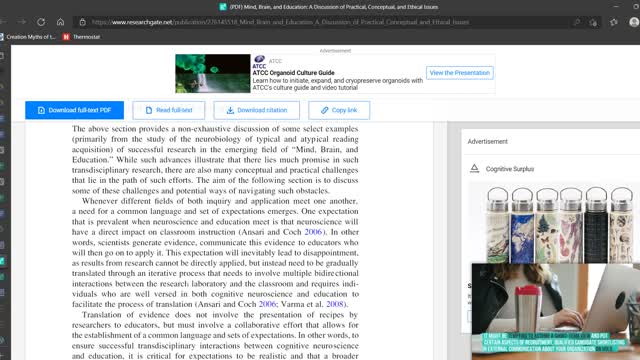Premium Only Content

Casual Audio Papers 3: Mind, Brain, and Education: A Discussion of Practical, Conceptual, and Eth...
Casual Audio Papers 3: Mind, Brain, and Education: A Discussion of Practical, Conceptual, and Ethical Issues. By D. Ansari
Casual Audio Papers is partly for personal use. I want relisten to them while I work to improve my knowledge base, but it is also for anybody else who is interested in Psychology and Neuroscience who doesn't have a lot of time. I noticed while I work I often want to listen to something educational, but I mostly have to listen to audiobooks or lectures, but never get any cold, hard papers. And there is a big difference. So here it is.
Xeilias Canani is studying Psychology towards a Masters, and will hopefully gain a Psy.D in Clinical Psychology to start a practice.
https://thelearningsciences.com/portfolio-items/bundle-collection-harvard/?lang=en#
Ansari, D. (2015). Mind, brain, and education: A discussion of practical, conceptual, and ethical issues. In J. Clausen & N. Levy (Eds.), Handbook of neuroethics (pp. 1703-1719). Springer. https://doi.org/10.1007/978-94-007-4707-4_146
Key Takeaways: Mind-Brain-Education / Neuroeducation is a transdisciplinary field that combines Cognitive Neuroscience and the Educational sciences in order to produce better learning outcomes in students.
It is important to create a more ubiquitous bridge between the researchers and the practitioners (the scientists and the teachers) in order to produce these better outcomes.
There are no 'quick fixes' by researchers. This is partly because of the general limitations by the scientific methodologies. Although, the research is very helpful in what they do help us to understand, so long as they are understood within their proper domains.
Therefore, it is increasingly important to bridge that gap, but also to remain humble in what the data does say. The data need to be put through the rigor of experimentation before implementation within the educational fields.
-
 LIVE
LIVE
GamingWithHemp
2 hours agoCall of Duty BO6 Zombies episode #7
395 watching -
 39:47
39:47
Brewzle
1 day agoPennsylvania Wouldn’t Let Me Film…So I Went Bourbon Hunting in NY
3562 -
 10:12
10:12
Space Ice
21 hours agoBallistic: Ecks vs Sever - Underrated Masterpiece Or Incoherent Mess?
9248 -
 2:43:07
2:43:07
RG_GerkClan
4 hours agoLIVE: Lets Get to 500 FOLLOWS! - Escape From Tarkov - Gerk Clan
4.32K2 -
 LIVE
LIVE
Vigilant News Network
18 hours agoHillary Clinton EXPOSED In Another Massive Hoax | The Daily Dose
2,129 watching -
 1:00:17
1:00:17
Trumpet Daily
1 day ago $5.12 earnedRINOs Are Trump’s Biggest Enemy Now - Trumpet Daily | Nov. 22, 2024
3.32K16 -
 17:47
17:47
RealReaper
13 hours ago $0.03 earnedGladiator 2 Another Pointless Sequel
1131 -
 45:45
45:45
PMG
11 hours ago"Hannah Faulkner and Stephanie Nash | No Farms No Food"
166 -
 27:11
27:11
Degenerate Plays
1 day agoReturn Of The Online Girlfriends - Stellar Blade : Part 30
71 -
 7:16
7:16
SeasonofMist
2 days agoSOLSTAFIR - Fjara (Official Music Video)
282